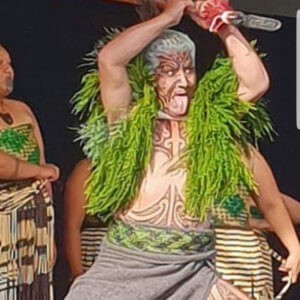 Skilled in the use of taiaha, Tipene Rangihuna schools inmates on the correct use of the traditional long staff in teaching EIT’s te reo Māori programmes at Hawke’s Bay Regional Prison.
Skilled in the use of taiaha, Tipene Rangihuna schools inmates on the correct use of the traditional long staff in teaching EIT’s te reo Māori programmes at Hawke’s Bay Regional Prison.
Papa T, as Tipene is widely known, says learning how to brandish the taiaha builds confidence, so the prisoners he and kaiāwhina (learning facilitator) Chantze Rohe teach graduate from the levels 2 to 4 language programmes with better results.
“When you put the taiaha in their hands, you will find the ancestor of that warrior comes through,” say Papa T. “Once they find out who they are, there are absolute long-term benefits from that.”
EIT’s Te Ūranga Waka shoulder-tapped Papa T for the job, and he has now been teaching at the Hawke’s Bay prison for more than three years. Chantze was also hand-picked, bringing his own skills and experience to his teaching position – he is a national kapahaka performer, has a degree in Māori arts and plays the guitar.
In total, nearly 100 inmates have gained te reo qualifications. Recidivism has dropped among graduates, and several of the prisoners have progressed to degree study.
For Papa T, teaching meant coming out of retirement, and he was loathe to give up time spent working with his beloved horses on his rural property at Maraekakaho.
The drawcard was the opportunity to work with a class of Ngāti Porou inmates but, from the outset, the educational opportunity attracted widespread interest from prisoners and staff.
Māori from different iwi, including Ngāti Kahungunu, are drawn to studying the programmes.
Of Ngāti Porou descent, Papa T grew up in Te Araroa with te reo as his mother tongue. He started teaching te reo at a kōhanga reo in 1982 – the first Māori man, he says, to do so. When the youngsters moved on to primary school, he was asked to teach them there too and then later at the kura kaupapa in Waiwhetū, Lower Hutt.
A black belt in karate, his interest in taiaha was nurtured by a master of the art, the late Mita Mohi from Te Arawa, who also taught at Mangaroa.
Having started teaching at the prison for just a few hours a week, Papa T’s commitment has increased to three 13-week programmes a year and students now include high security inmates.
Low and medium risk prisoners warned him that “they’re all lunatics in there”, but he says he’s had no problems at all.
“Gang members have separate classes and many work out. They’ve got muscles on their eyelashes, but they show me respect.”
Turning 68 this year, Papa T tells his students not to try matching him at taiaha but to aim at doing it better.
“Otherwise,” he smiles, “they’ll only have the proficiency of an old man.”
